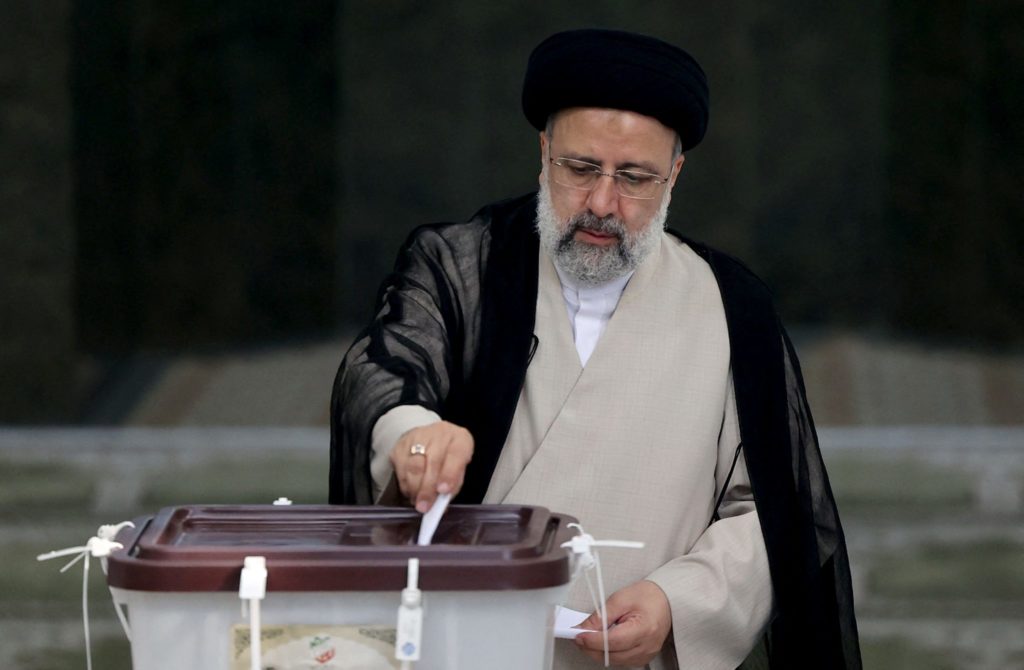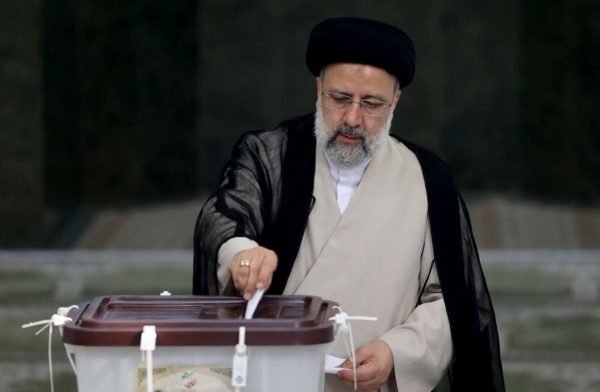By Adam Kredo and Alana Goodman •

Iran’s presidential frontrunner personally approved the secret mass murder of hundreds of regime critics in 1988—and can be heard defending and laughing about the gruesome massacre in a decades-old audio recording translated by the Washington Free Beacon.
Ebrahim Raisi, a cleric who serves as chief justice of Iran, is reported to be Supreme Leader Ali Khamenei’s favored candidate to win Friday’s presidential election, which most international observers see as a sham given the regime’s decision to disqualify any candidate viewed as a moderate. Raisi, who served as deputy prosecutor of Tehran in 1988, sat on a four-man panel that oversaw the killings of nearly 1,000 political prisoners. In an August 1988 audio recording, members of the commission can be heard defending the executions, arguing in support of killing 200 additional prisoners, and even laughing about their efforts to expedite the murders.
The recording indicates the Iranian regime is poised to empower one of the most hardline presidents in decades—a setback for the Biden administration which seeks closer relations between the United States and Iran. While Raisi’s overseeing of torture is well–documented, the audio independently translated by the Free Beacon sheds new light on Raisi’s principal role in authorizing the killings.
Raisi’s likely election comes as the Biden administration seeks to reenter the 2015 nuclear accord, which would pave the way for Iran to receive billions of dollars in sanctions relief. A radical new president could complicate the negotiations, as Iran signals that it wants more than was promised under the Obama administration’s original agreement. Outgoing president Hassan Rouhani, who was widely praised by the American media as a moderate, has backed his government’s demand for across-the-board sanctions relief, including on the country’s contested nuclear and missile programs.
In 1988, then-supreme leader Ruhollah Khomeini issued a fatwa that established “death commissions” in Iranian provinces, in order to execute nonviolent political dissidents who were already serving out prison sentences but had refused to renounce their political or religious affiliations and swear allegiance to the Islamic Republic.
The family of the late Grand Ayatollah Hossein Ali Montazeri, who objected to the killings and was the heir apparent to the supreme leader at the time, published a recording of a 1988 panel meeting online in 2016. Montazeri had requested a meeting with the Tehran panel in 1988 to voice his strong opposition to the executions—a stance that later cost Montazeri his place in the line of succession and his clerical title.
During the meeting, a member of the committee noted that each of the executions were approved by all four men on the panel, according to a translation of the tape provided to the Free Beacon by Saeed Ghasseminejad, a senior Iran expert with the Foundation for Defense of Democracies.
Raisi can be heard discussing the difficulty of resuming family visits at the prisons, which had been suspended to prevent news of the executions from reaching the public, noting that “all families [of the inmates] are worried.”
Another member of the panel defended their decision to execute young female dissidents—whom he called “girls”—saying “we bargained as much as we could” to get them to renounce their views.
The audio becomes heated at times, with Montazeri calling the death commission an “atrocity” and telling the panel that they will go down in history as criminals.
The panel rejected Montazeri’s request to halt the executions during the Islamic month of Muharram but said they had hoped to finish the killings sooner.
“Meaning [you wanted to] kill them quickly?” asked Montazeri, prompting the death panel to break into laughter.
In total, 3,800 dissidents were killed under the death panels throughout Iran, according to Montazeri’s memoir. Many of the victims were buried in mass graves and their bodies have not been recovered.
Details of the death commissions are still a closely guarded secret inside the Iranian government. Raisi downplayed his involvement with the Tehran panel in 2018, arguing that “during the period [in question], I was not the head of the court.… The head of the court issues sentences whereas the prosecutor represents the people.”
He also, however, alluded to his support for the mass executions, describing the time as “one of the proud achievements of the system.”
Raisi’s ascension to the presidency is a setback for American proponents of increased diplomacy with Iran. While outgoing president Hassan Rouhani enjoyed a reputation as a moderate who could ease rapprochement with the United States, the ayatollah’s selection of Raisi sends a message that Tehran has no intention of moderating its behavior, even in light of continued nuclear talks in Vienna.
Iran’s primary objective is pushing the Biden administration into granting significant sanctions relief, which have decimated the country’s economy and sparked anti-regime protests. The Biden administration hoped to reenter the nuclear agreement before Friday’s election took place as U.S. officials remain concerned that Iran’s hardline shift could endanger their diplomatic efforts.
Raisi, at one point, was also being groomed to become the country’s next supreme leader, a position he is now closer to securing. He is also likely to continue permitting Iran’s Revolutionary Guard Corps, the country’s terrorist fighting force, to sponsor terrorism across the region, including in hotspots like Syria, Yemen, and Iraq.
FREE BEACON


Leave a Reply
You must be logged in to post a comment.